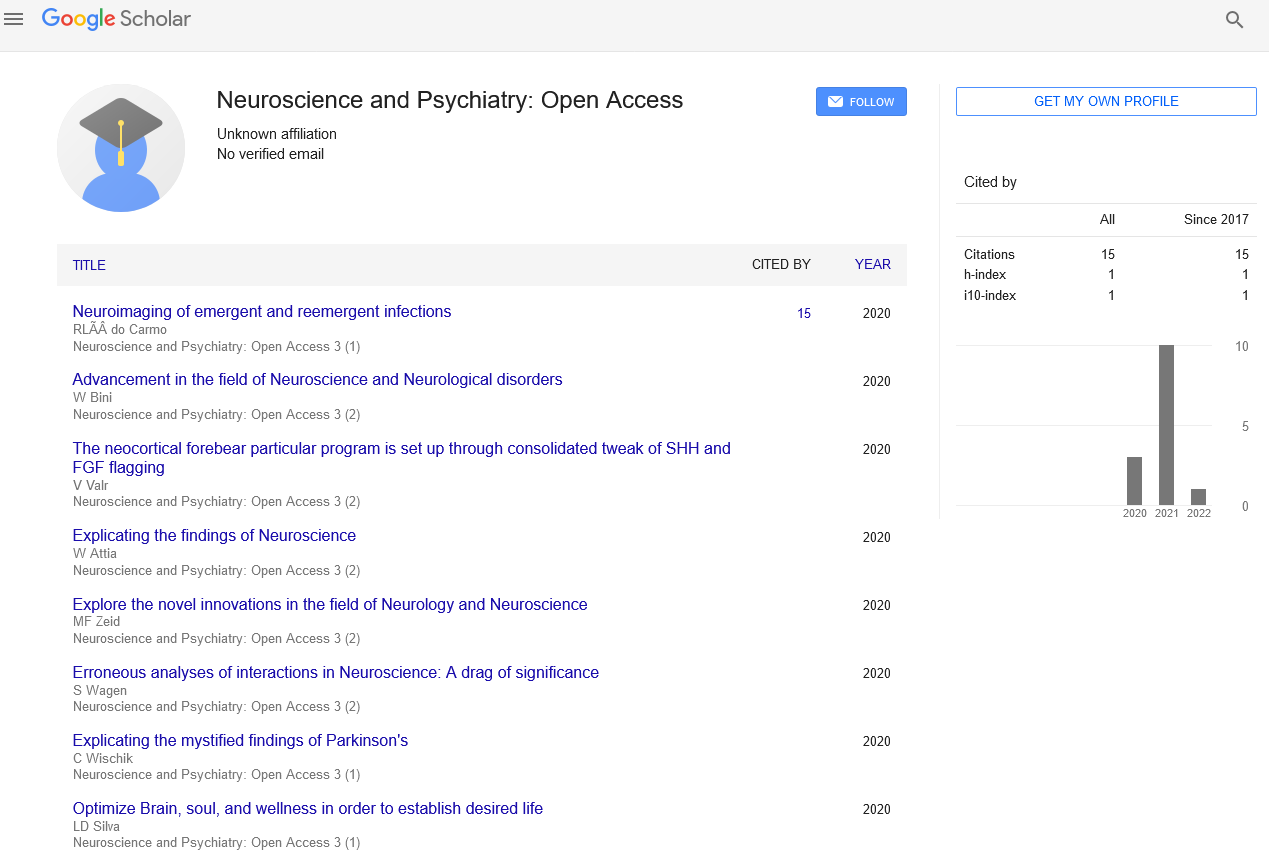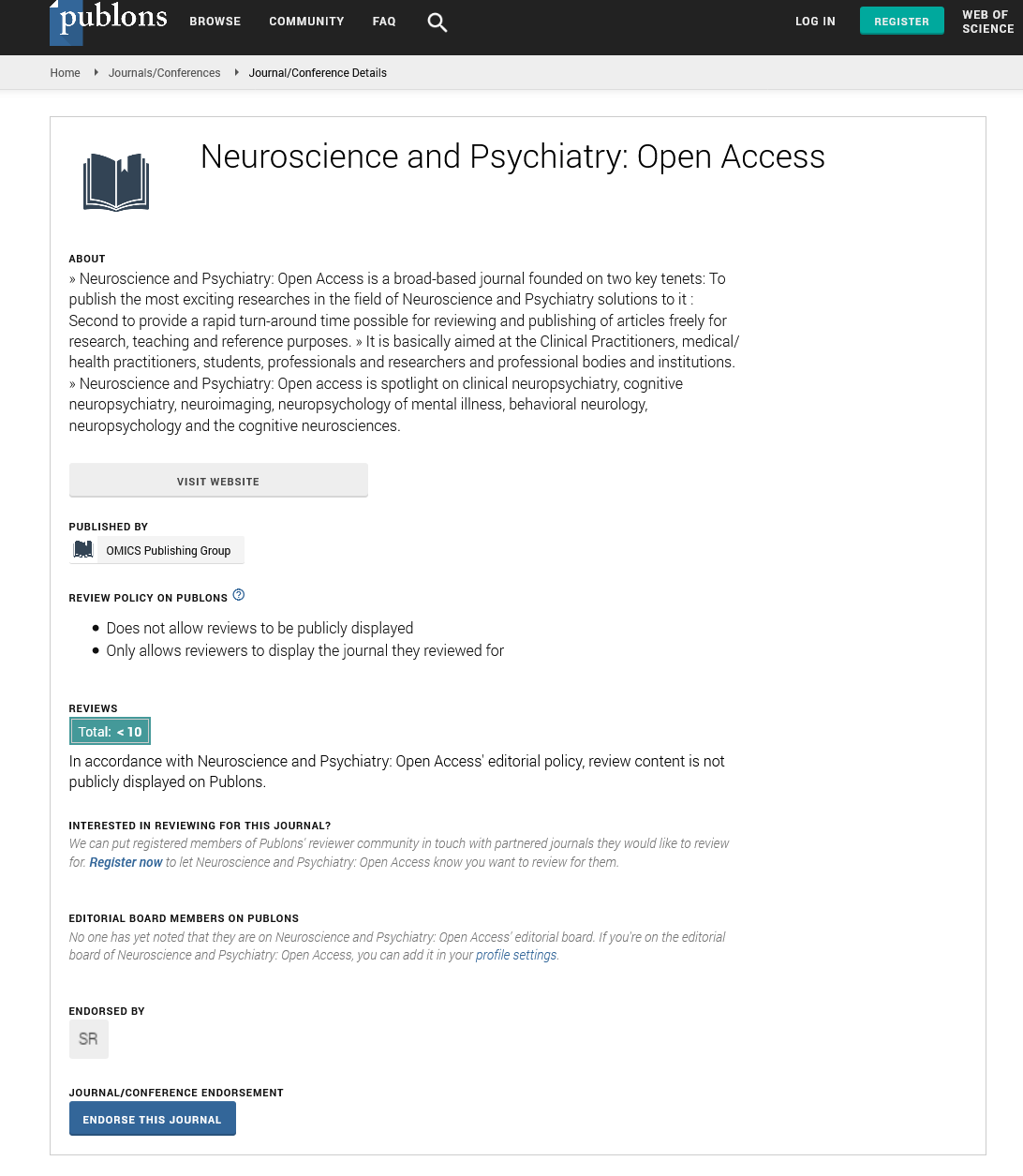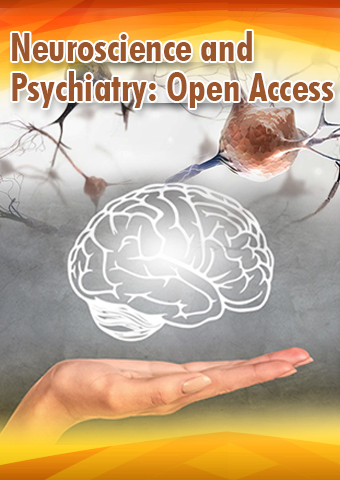Perspective - Neuroscience and Psychiatry: Open Access (2023) Volume 6, Issue 6
Navigating the Labyrinth of Neurological Disorders: Understanding, Managing, and Coping with Brain Challenges
- Corresponding Author:
- Olivia Dean
Department of Neurology, Westmead Hospital, Westmead, NSW, Australia
E-mail: olivia.d@deakin.edu.au
Received: 07-11-2023, Manuscript No. NPOA-23-119637; Editor assigned: 10-11-2023, PreQC No. NPOA-23-119637 (PQ); Reviewed: 24-11-2023, QC No. NPOA-23-119637; Revised: 30-11-2023, Manuscript No. NPOA-23-119637 (R); Published: 08-12-2023, DOI: 10.47532/npoa.2023.6(6).143-144
Introduction
The human brain is a marvel of complexity, responsible for our thoughts, emotions, memories, and bodily functions. However, this intricate organ is also susceptible to a myriad of challenges, manifesting in various neurological disorders that can profoundly impact an individual’s quality of life. In this article, we will embark on a journey through the world of neurological disorders, exploring their causes, manifestations, management, and the importance of support and understanding for those affected.
Neurological disorders encompass a broad spectrum of conditions that affect the nervous system. The nervous system comprises the Central Nervous System (CNS), which includes the brain and spinal cord, and the Peripheral Nervous System (PNS), responsible for transmitting messages between the CNS and the rest of the body.
Description
Neurological disorders can be categorized into several main groups, including:
• Neurodevelopmental disorders: These conditions typically manifest early in life and include
disorders like autism spectrum disorder and Attention Deficit Hyperactivity Disorder
(ADHD).
• Neurodegenerative disorders: These conditions involve progressive degeneration of nerve
cells and include Alzheimer’s disease, Parkinson’s disease, and Amyotrophic Lateral Sclerosis
(ALS).
• Neuropsychiatric disorders: This category encompasses disorders that affect both the
nervous system and mental health, such as schizophrenia and bipolar disorder.
• Stroke and cerebrovascular disorders: Strokes and other cerebrovascular conditions result
from interrupted blood flow to the brain, often causing severe and sudden symptoms.
The causes and risk factors
Neurological disorders can have a multitude of causes, often involving a complex interplay of genetic, environmental, and lifestyle factors. Some key contributors to these disorders include:
• Genetic factors: Many neurological disorders have a genetic component, meaning they can
be passed down through families. Genetic mutations may increase the risk of conditions like
Huntington’s disease and certain forms of epilepsy.
• Environmental factors: Exposure to toxins, infections, or injuries can also contribute to the
development of neurological disorders. Traumatic Brain Injuries (TBIs) and lead exposure
are examples of environmental factors that can lead to neurological issues.
• Lifestyle factors: Lifestyle choices, such as diet, exercise, and substance use, can influence the
risk of developing neurological disorders. A sedentary lifestyle, for instance, can contribute
to conditions like obesity, which is a risk factor for stroke and other neurological issues.
Manifestations of neurological disorders
The symptoms of neurological disorders are as diverse as the disorders themselves. They can encompass a wide range of cognitive, motor, sensory, and emotional issues. Some common neurological disorder symptoms include:
• Cognitive impairment: Conditions like
Alzheimer’s disease and dementia can result
in memory loss, confusion, and difficulty
with problem solving and language.
• Motor dysfunction: Parkinson’s disease,
multiple sclerosis, and ALS can lead to
motor symptoms such as tremors, muscle
weakness, and loss of coordination.
• Sensory disturbances: Sensory disorders, like
neuropathy, can cause numbness, tingling,
and pain in the extremities.
• Seizures: Epilepsy is characterized by recurrent
seizures, which can manifest as uncontrolled
shaking and loss of consciousness.
• Behavioral and emotional changes: Conditions
like depression and anxiety often co-occur
with neurological disorders, impacting an
individual’s mental and emotional well-being.
Diagnosis and management
Diagnosing and managing neurological disorders often require a multidisciplinary approach involving neurologists, psychologists, physical therapists, and other specialists. The diagnostic process may involve medical history reviews, physical examinations, and various diagnostic tests, such as MRI and EEG.
Management strategies vary widely depending on the specific disorder but can include:
• Medications: Many neurological disorders
can be managed with medication. For
example, anti-epileptic drugs are used to
control seizures, while levodopa is prescribed
for managing Parkinson’s disease.
• Physical and occupational therapy: Physical
and occupational therapists play a crucial
role in helping individuals with neurological
disorders regain or maintain their motor
and daily living skills.
• Cognitive and behavioral therapies: For
disorders affecting cognition or behavior,
such as depression and anxiety, psychotherapy
can be beneficial in managing symptoms.
• Surgical interventions: In some cases, surgical
procedures, like deep brain stimulation for
Parkinson’s disease, may be considered to
alleviate symptoms or improve function.
• Supportive care: A support network of
family, friends, and caregivers is essential in
managing the daily challenges of living with
a neurological disorder. Support groups and
counseling can offer emotional support and
guidance.
The importance of support and understanding
Living with a neurological disorder can be incredibly challenging, both for the affected individual and their loved ones. It’s essential to recognize the significance of support and understanding in managing these conditions.
• Eliminating stigma: Reducing the stigma
associated with neurological disorders is
crucial. Society must acknowledge that
these conditions are not a result of personal
shortcomings but rather the complex
interplay of genetic and environmental
factors.
• Raising awareness: Advocacy and public
awareness campaigns can help educate the
public about the realities of living with
neurological disorders and the importance
of early diagnosis and access to treatment.
• Providing emotional support: Friends
and family can provide valuable emotional
support by offering a listening ear, empathy,
and encouragement. Caregivers and support
networks play a pivotal role in the wellbeing
of those affected.
Conclusion
Neurological disorders are a diverse and challenging group of conditions that can profoundly impact individuals and their families. While these conditions can be complex and often difficult to manage, early diagnosis, access to appropriate treatment, and a strong support network can make a significant difference in the quality of life for those affected.
As we continue to advance our understanding of the causes and management of neurological disorders, there is hope for better treatments and interventions in the future. Ultimately, fostering a compassionate and empathetic society that supports and understands the challenges faced by those with neurological disorders is a fundamental step toward improving the lives of countless individuals around the world.


